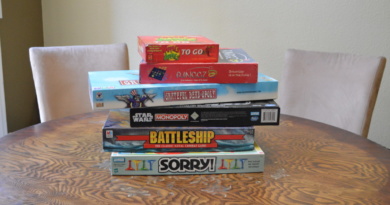Holiday secularity
A bus drives north on Anderson, flashing an all capital letters “Happy Holidays” before displaying its next destination. This bus is just one example of how businesses and people stay secular during the holiday season.
Business windows are painted to look like a Christmastime scene with big letters reading, “Happy Holidays” across it. Some businesses have their “Holiday Sales” advertised with the common Christmas colors, green and red.
“Merry Christmas” or “Happy Holidays”
During Christmastime, some people wonder if they should greet people with “Happy Holidays”, or “Merry Christmas”.
“I do worry (about saying Merry Christmas) sometimes because I don’t want others to feel as though I don’t accept them or their culture. I like to include people.” Sam Ramos, a sophomore, said. Ramos and her family celebrate Christmas.
However, while it is good to include most everyone, there may be little to no necessity to worry about being all inclusive with holiday greetings during Christmastime. Many students at DHS who do not celebrate Christmas do not mind if they are wished a “Merry Christmas”.
“I just think it’s their way of saying, “have a nice day”. I, of course, do not say a holiday greeting back to them. I just smile” sophomore Mae Ling Kong said. Kong is a devout Jehovah’s Witness, as is the rest of her family.
Jehovah’s Witnesses are forbidden to practice any holiday such as birthdays, Christmas, Thanksgiving, or Easter because they are all believed to have pagan roots.
One Jewish student, sophomore Lucy Hass feels similarly to Kong.
“I don’t think that someone saying, “Merry Christmas” to me is a big deal. It’s not offensive or anything, they’re just spreading the good cheer” Hass said. Hass and her family celebrate Hanukkah and are members of Temple Bet Haverim, located on Anderson Rd. in Davis, Calif.
However, sophomore Eliana Jolkovsky is not bothered if someone says, “Merry Christmas” to her, but would prefer if people said happy holidays if they knew she wasn’t Christian. Jolkovsky also celebrates Hanukkah and is also a member of Temple Bet Haverim.
Another Jewish student, sophomore Victoria Mohtes-Chan, says she isn’t bothered when people tell her to have a “Merry Christmas” but she thinks it is funny when people just assume that everybody celebrates Christmas like they do.
The Secularity at School
Although public schools are not run by any religious organization, many teachers and school activities are not entirely secular.
For example, in the Davis school district, two weeks are allowed for a “winter break”, which falls during Christmastime. Some teachers and students call the break, “Christmas break”.
“I don’t really care or notice. I’m pretty sure I call it Christmas break sometimes too, it’s not really a big deal,” Hass said.
In elementary school, and sometimes junior high and high school, a class will have a party the day before winter break. These parties are generally secular, but a lot of kids bring in food that celebrates Christmas.
“I only remember being to holiday parties in general, not Christmas parties. I never felt left out,” Jolkovsky said.
Kong, however, avoided these parties because she celebrates no holidays.
“Of course I was different because I didn’t celebrate the holidays, but my parents did something special with me when I left school early because of a holiday party” Kong said.
Mohtes-Chan would bring dreidels, latkes, or a menorah to school and teach her fellow classmates about it during these parties.
Korematsu Elementary school science teacher Sarita Cooper does not view Christmas as a religious day.
“I was raised in an Atheist family. It is not to me a Christian holiday. It is an American holiday,” Cooper said.
As a science teacher, Cooper has not had holiday celebrations in her classroom for many years, but when she taught a regular elementary school classroom, she had holiday celebrations.
“It sort of annoys me that everybody has to avoid it now. Back when I started teaching, we had Christmas trees, we had Menorahs. Nobody questioned it. Everything’s off limits and it annoys me” Cooper said. “I’m not sure we should try to make everything fit every person.”
Holiday Sales
Many holiday sales are marketed using Christmas colors, or even by being called a “Christmas sale”.
However, this does not stop people who do not celebrate Christmas from going to these sales.
“We shop at stores that have Christmas sales all the time, it’s not like we expect stores to have special Hanukkah sales for the like, 2 percent of the population that’s Jewish,” Hass said.
Stores that have way too many Christmas decorations may scare away some people who do not celebrate Christmas, however.
“I like Christmas lights but the Nativity scenes can get too religious” Mohtes-Chan said.
No Winter Holidays
Some people celebrate no holidays in winter, so they might do something else over break, or do nothing at all.
Kong, for example, normally goes and does something with her family.
“I always asked kids what they did during the holiday break, and I always had way more fun,” Kong said.
Another student who does not celebrate any holidays is sophomore Eddie Subedi, who is Athiest. He and his family came to America from Nepal in 2006.
“[Christmas] is kind of weird,” Subedi said.



